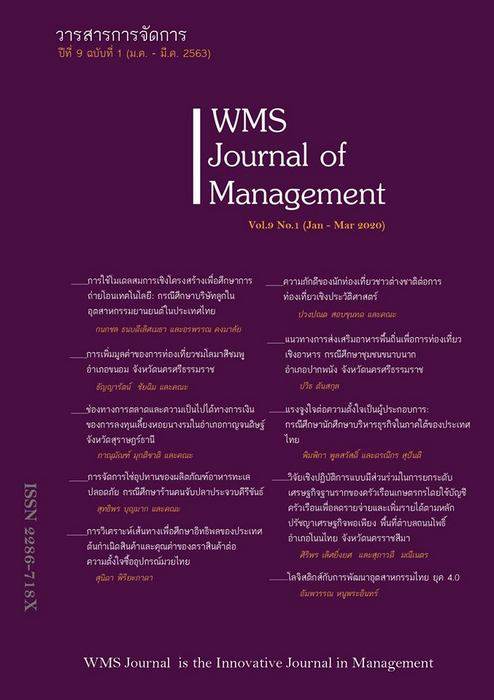Supply Chain Management of Safe Seafood Products: A Case Study of Fisherfolk Shop in Pracuap Khiri Khan Province
Main Article Content
Abstract
The objective of this paper are to study supply chain management and to identify the key stakeholders of Fisherfolk enterprise in Prachuap Khiri Khan Province. Qualitative research was employed and a case study was conducted to gain insight knowledge and understanding. A unit of analysis is at organizational level. The study found that the supply chain was classified into 3 parts: 1) the upstream supply chain (the small-scale fisherfolk as suppliers of aquatic animals); 2) the midstream supply chain (Prachuap Khiri Khan Fisherfolk enterprise as a manufacturer for seafood products) and 3) the downstream supply chain (a Fisherfolk shop in Bangkok selling the products to consumers) Fisherfolk enterprise is a social enterprise originated from Non-Government Organization (NGO) that comes to serve small-scale fisherfolk, who initiate marine resource conservation. The enterprise provides products to consumers, who need safe seafood, and support the small-scale fisherfolk for the marine resource conservation. The Fisherfolk enterprise allows small-scale fisherfolk to sell aquatic animals at a fair price and provide consumers organic seafood products, which can trace the products back to the suppliers. The quality of seafood products are under the Blue Brand standard, which supports marine resource conservation for sustainability. The government should support this form of social enterprises that facilitate small-scale fisherfolk to make fisheries more responsible for marine resources.
Article Details
References
Bangkokbiznews. (2015). ‘Fisherfolk’ rư̄ang lao ‘khō̜ng khon čhap plā ' [‘Fisherfolk’ Tale of ‘Fish Catcher’]. Retrieved from http://www.bangkokbiznews.com/news/detail/651374
Carter, C. R. & Rogers, D. S. (2008). A framework of sustainable supply chain management: moving toward new theory. International Journal of Physical Distribution & Logistics Management, 38(5), 360-387.
Chidchob, T., Sompen, N., Yaowasakunmat, S. & Dungwak, P. (2014). kānphatthanā bǣpčhamlō̜ng sō ʻuppathān khō̜ng khāohō̜mmaliʻinsī nai prathēt Thai [Organic jasmine rice supply chain development in Thailand model]. Khon Kaen AGR. J., 42(2), 243–249.
Fisherfolk. (2018). rān khon čhap plā [Fisherfolk]. Retrieved from http://fisherfolk.org/
Kaewsun, K. & Sutamuang, K. (2016). ʻitthiphon khō̜ng kānčhatkān khwāmsamphan kap phū čhathā watthudip thī mī tō̜ phonlakā rō̜dam nœ̄n kān dān kānčhat sư̄ čhathā phak læ phonlamai sot nai rānkhā plīk samai mai nai prathēt Thai [Influence of relationship management with raw material suppliers on performance purchasing fresh vegetables and fruits in modern retail stores in Thailand]. RMUTT Global Business and Economics Review, 11(2), 11-22
Matichon. (2016, December 15). Fisher Folk: rān khon čhap plā kān plīan phān sū thurakit phư̄a sangkhom [Fisher Folk: Fishing shop, transition to social business]. Retrieved from https://www.matichonweekly.com/scoop/article_17942
Mont, O. & Leire, C. (2009). Socially responsible purchasing in supply chains: drivers and barriers in Sweden. Social Responsibility Journal, 5(3), 388-407.
Sangworn, S. & Teeravaraprug, J. (2012). tonthun sō ʻuppathān khō̜ng plāsom fak: kō̜ranī sưksā OTOP ʻamphœ̄ bānmī čhangwat lop burī [Supply chain cost of Pickled fish: a case study of OTOP Banmi Lopburi]. Mahanakorn Technology Business Administration Journal, 9(1), 84-97.
Schaltegger, S. & Burritt, R. (2014). Measuring and managing sustainability performance of supply chains. Supply Chain Management, 19(3), 232-241.
Schneider, L. & Wallenburg, C. M. (2012). Implementing sustainable sourcing–Does purchasing need to change. Journal of Purchasing and Supply Management, 18(4), 243-257.
School of Change Makers. (2017). ‘rān khon čhap plā ' tonbǣp NGO thī khayāi ngān dūai kitčhakān phư̄a sangkhom phư̄a phatthanā sētthakit pramong phư̄nbān yāng yangyư̄n [‘Fisherfolk’ an NGO model that expands with social enterprise to develop sustainable local fishery economies]. Retrieved from http://www.scaling-impact.com/fisherfolk/
Siriphattrasophon, S. (2015). kānsưksā krō̜p nǣokhit phư̄a kānphatthanā wisāhakit phư̄a sangkhom nai prathēt Thai kānsưksā krō̜p nǣokhit phư̄a kānphatthanā wisāhakit phư̄a sangkhom nai prathēt Thai [A conceptual study of social enterprise development in Thailand]. Journal of Researchers Association, 20(2), 30-47.
Supply Chain Council. (2012). SCOR: supply chain operations reference model revision 11.0. Retrieved from https://docs.huihoo.com/scm/supply-chain-operations-reference-model-r11.0.pdf
Theeranuphattana, A. & Tang, J. (2009). kānphatthanā bǣpčhamlō̜ng kān wat samatthana sō ʻuppathān dōi prayuk chai withīkān wat khō̜ng Chan and QI (thritsadī fatsīsēt) kap krō̜p kānthamngān SCOR [Development of supply chain performance measurement models by applying the measurement method of Chan and QI (Fuzzy set theory) and the SCOR framework]. Faculty of Commerce and Accountancy Thammasat University, 32(121), 11–33.
Thoucharee, S. & Pitakaso, R. (2012). kānčhatkān lōčhittik læ sō ʻuppathān khāo nai phāk tawanʻō̜k chīang nư̄a khō̜ng prathēt Thai [Logistics and supply chain management of rice in the northeastern Area of Thailand]. KKU Res. Journal, 17(1), 125-141.
Wisner, J. D., Tan, K. C. & Leong, G. K. (2012). Supply chain management: A balanced approach (3rd ed.). Mason: South-Western Cengage Learning.


